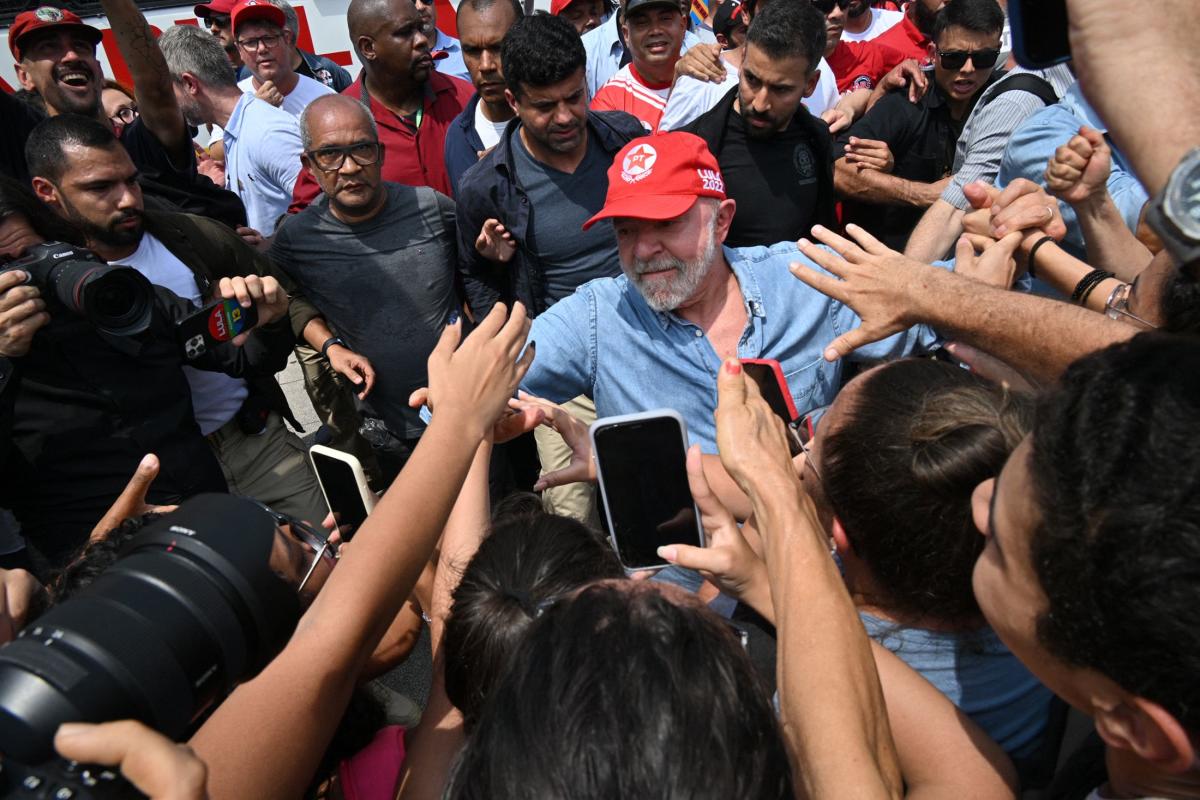
(Bloomberg) — Luiz Inacio Lula da Silva returned to his industrial roots in Sao Bernardo do Campo to reboot his bid for Brazil’s presidency.
Most Read from Bloomberg
He chose the satellite city on Sao Paulo’s outskirts for a rally kick-starting his campaign for the runoff. Known as the cradle of Brazil’s labor movement, it’s here that he emerged as a political force in the 1970s, founding the metalworkers’ union, organizing strikes and leading marches.
“This is the street where we traditionally carry out our demonstrations, ever since the founding of the Workers’ Party,” the two-times former president told supporters on Oct. 6. “We’re at home here in Sao Bernardo do Campo.”
Lula won the city of some 900,000 in the first round of voting. But he unexpectedly lost the overall state of Sao Paulo to Jair Bolsonaro by almost seven percentage points, a defeat that has Lula’s team scrambling to shore up support before the Oct. 30 showdown.
Inside Lula’s campaign, the result in Brazil’s most populous state — the birthplace of his political career, and containing about 25% of the entire electorate — was compared to a plane crash, where a confluence of small factors leads to catastrophe. At his team’s first post-election meeting, the talk was of frustration and failure.
Edinho Silva, the former president’s campaign coordinator, may have had an inkling of what was to come, saying in an interview on the eve of polling that Sao Paulo had become a center of hard-core support for Bolsonaro’s brand of right-wing identity politics.
“We have a percentage of Brazilian society that, unfortunately, is racist, homophobic, sexist, xenophobic, and doesn’t accept the social ascent of the lower classes,” he said. “And a significant part of Brazil that thinks in this way lives in Sao Paulo.”
Lula himself rose from the factory floor to become a union organizer in Sao Bernardo, which was then synonymous with the auto industry. His support there remains strong: He won by more than 10 points.
But just as the car plants of his youth are now gone, Lula’s failure to take a state he once dominated — one that represents about a third of Brazil’s economy — reflects a new reality in which Bolsonaro has dug a significant foothold into the political landscape. Even as polls suggest that Lula continues to have the advantage over the incumbent nationwide, the kind of deeply entrenched politics on display in Sao Paulo will pose the greatest challenge for whomever emerges the winner.
“Sao Paulo is the state of meritocracy”
Long known as Brazil’s Detroit, Sao Bernardo is trying to reinvent itself, but it hasn’t been easy. Many former car plant workers are unemployed or working in local commerce, in small shops, or in the gig economy.
“We want to have the right to work, to study, to have breakfast, to have a lunch every day,” Lula said at the Sao Bernardo rally.
That kind of message still resonates in urban settings: Lula secured more votes than Bolsonaro in the state capital of Sao Paulo, 47.5% to 38%, but the president had an advantage of more than 20 points in the countryside. Sao Paulo city has about 9 million voters, and there are 25 million in the hinterland.
“Sao Paulo is the state of meritocracy, free enterprise, and entrepreneurship,” said Ricardo Salles, a Bolsonaro ally and former environment minister who was overwhelmingly elected to congress from the state. “Sao Paulo countryside, in particular, also has a strong belief in the defense of the traditional family. All of these points are represented by the conservative liberal right-wing.”
Bolsonaro had a remarkable performance four years ago, taking about 68% of the state’s votes in an election that took place against the backdrop of the Carwash corruption scandal that had seen Lula jailed that year. Lula was subsequently released and his sentence quashed, allowing him to run again. The result earlier this month showed that Brazilians haven’t forgotten — and that Bolsonaro’s appeal is more lasting that thought.
Read how Bolsonaro and his allies have become fixtures in Brazil
Lula’s candidate for state governor, Fernando Haddad, didn’t help his cause. All surveys showed Haddad ahead, but Bolsonaro’s pick, Tarcisio de Freitas, won by about 7 percentage points. The race for the governorship also goes to a runoff.
Lula’s team has responded to the first-round setback by launching an operation to besiege the most important cities in Sao Paulo with rallies and marches. In the days following the campaign stop in Sao Bernardo, Lula visited Guarulhos, site of Brazil’s largest airport, and Campinas, one of the largest cities of the hinterland. Lula lost to Bolsonaro in both places.
“We will turn things around and win in Sao Paulo,” Haddad told hundreds of Lula supporters Monday at yet another rally there, in the city’s Sao Mateus district.
Lula’s running mate, Geraldo Alckmin, is meanwhile touring the Sao Paulo countryside. A conservative, Alckmin governed the state for three terms, and in 2006, when he unsuccessfully ran for president against Lula, he recorded the best performance of any candidate there.
To Denilde Holzhacker, a political science professor at the ESPM college in Sao Paulo, Lula’s campaign made a mistake by not making more use of Alckmin before the first round. The focus was on explaining the alliance to Lula’s base, rather than attempting to win over voters from the opposing camp, she said, when “the logic should have been the other way round: Explaining to conservative voters why Alckmin decided to ally himself with Lula.”
At the same time as trying to boost their own candidate’s appeal, Lula’s team is working to increase people’s rejection of Bolsonaro. It’s a strategy based on the premise that polarized Brazilians will choose the least-bad option in the end.
Despite the campaign’s efforts, the predictions for the runoff inside Lula’s team are not optimistic, and the main strategy for the closing days is damage limitation. Nobody has the illusion that it’s possible for Lula to beat Bolsonaro in Sao Paulo.
Nationally, Lula’s lead narrowed in an Ipespe poll released late Tuesday that put support for the leftist leader at 53% to 47% for the incumbent. The Oct. 17-18 survey of 1,100 voters had a margin of error of 3 percentage points.
For Guilherme Boulos, a Lula ally and the congressman who won the most votes in Sao Paulo, the former president’s campaign needs to connect with voters who chose other candidates in the first round, as well as those who abstained or spoiled their ballot.
“We will have to talk to these voters in a humble and democratic way,” he said.
(Updates with latest polling in third paragraph from end.)
Most Read from Bloomberg Businessweek
©2022 Bloomberg L.P.




